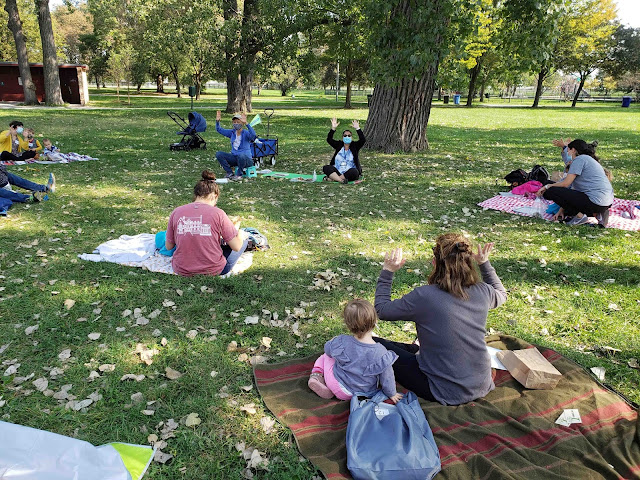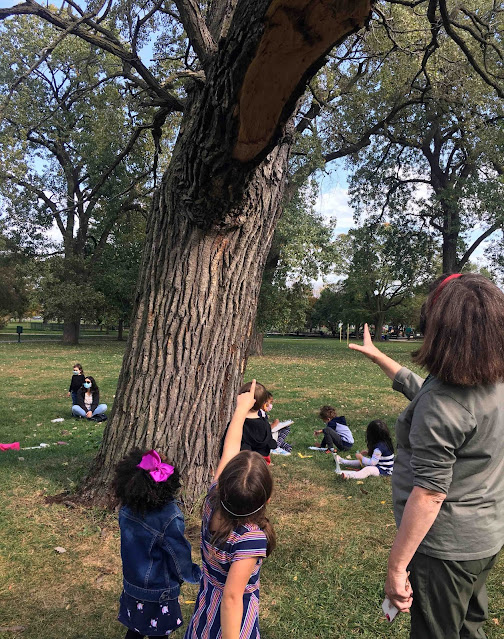These days, during the Coronavirus Pandemic, we all appreciate the outdoors more. In particular, we welcome the chance it gives us to gather safely.
At Akiba-Schechter, we have made good use of our outdoor spaces (two playgrounds, a courtyard, and the park across the street) for gym class (such as playing soccer), eating lunch on the lawn, or playing at recess. If the weather is particularly nice, we'll even hold a class outside.
Akiba-Schechter's preschool, however, has taken outdoor school to a whole new level.
Our Teva Means Nature program meets only outside. Taught by Early Childhood Director Carla Goldberg, preschool teacher Becky Rubin, nature educator Naomi Cobb, and preschool teacher and master naturalist Susan Carton, Teva Means Nature is offered in two sessions. Meeting on Tuesday and Wednesday afternoons, or Thursday and Friday mornings, it is open to children ages 0-6 who attend with a parent or caregiver. Currently, twelve to thirteen families are enrolled in each group.
The idea of nature and the world as the classroom, functioning as the "third teacher," has always been a big part of the preschool's approach. Classroom environments are set up to bring in nature.
Now, the outside has become the classroom.
Carla Goldberg and her team conceived of Teva Means Nature over the summer after she spoke to every preschool family that had been enrolled at Akiba-Schechter.
"Many families were not comfortable sending their child back to school in the fall, at least not in the same way that they had pre-Covid. But they clearly yearned to maintain their connection with Akiba, and we wanted to continue our relationship with these families. Just as we were able to pivot in March when we needed to take preschool online, and just as we offered a virtual summer program,
we decided to develop a program that would serve these children and their families who weren't ready to go back to school in person."
Parents echo that sentiment. "Akiba created a new curriculum just for us. It feels like such a gift and makes us feel committed to the school," comments Arielle Hirschfeld, who attends with her two children, 4 1/2 and 1 1/2 years old. As a physician who works with Covid patients, she feels it would be too risky for her children to be at school, in the classroom. Her older child was also resistant to online school. "This is the one way we can have school. It feels good to 'go to school' and have this structured time to focus on the kids. It's relaxing and enriching for me, too."
The Teva Means Nature curriculum includes what you could expect from any preschool class, such as group time or reading a book together.
At group time during the Jewish holiday of Sukkot, children learned about building a Sukkah and then attempted to create one using only materials they found in the park.
"Teva is our time to be with other kids, and my time to be with other parents. We're so isolated otherwise," comments Christina Salesberry, who attends with her 3 1/2-year old son.
"I appreciate how thoughtful the teachers set up activities to include us parents," Arielle Hirschfeld adds. "There's always a bag for us to pick up trash to help care for the park where we spend so much time."
Carla Goldberg sees the class as a manifestation of the Jewish Mitzvah (commandment) of "Shmirat HaTeva" - to guard and protect nature.
"It is important to teach children not only about nature, but also how to take care of nature. And I love pointing out that this is very much a Jewish value and helping them make that connection."
Developing social skills is a big benefit of going to preschool, and the teamwork and interaction in Teva among different ages supports that.
A lot of cooperative learning happens in Teva. Teachers give children a mission or invitation that involves working with a friend, which fosters problem solving and constructive thinking.
The Teva program is open ended and flexible. Teachers adjust activities as they observe the children's curiosity.
"It's amazing how they find a way to use the children's interests," Lauren Reeves observed. She attends with her Kindergartener, for whom the Teva program is a welcome complement to attending Kindergarten online.
She explains: "The teachers noticed that the kids were playing around with sticks and branches. So they tied pieces of chalk to the sticks to see what the kids would do with them. Or they offered colorful yarn to wrap around branches. This resulted in a beautiful sculpture."
Children are working on developing gross and fine motor skills when using art materials such as chalk, crayons, scissors, yarn, glue and colored pencils.
With the park as their classroom, there are lots of movement activities, such as spontaneous dancing, searching for acorns, or using large piece of fabric in the the wind.
Recently, families collected differently colored leaves and matched them to this "color wheel" fabric. Wind turned the fabric into a parachute-like dome, and the kids were dancing under it.
"It's such a benefit to be out in nature without any gimmicks or toys." says Christina Salesberry.
"I've noticed that my child is more aware of nature now. He's developed his own connection.
We'll be driving in the car, and he'll look out the window and say, 'Susan [one of the Teva teachers] would love that tree.'"
"I've learned to identify the hole of a woodpecker," she adds. Parents appreciate having a master naturalist along, "who really knows and can explain something."
Bringing in experts has always been part of Akiba's approach of diving deeply into the subject at hand.
Teva and the Kindergarten recently hosted an arborist. He brought tree rings for the kids to study and taught them how to tell the age of a tree, and how to determine whether it was healthy or not.
Teva has certainly inspired all of our classes to spend more time exploring and studying nature.
Making good use of Chicago's resources is a steady component of the Akiba curriculum from preschool through 8th grade.
The Teva class has made Harold Washington Park across the street from school their classroom, but they have also gone farther afield.
For example, they went on a field trip to the
Burnham Wildlife Corridor, a place many parents had never been to, even though Lake Shore Drive passes right by it. Here parents and children are exploring the
La Ronda Parakata Gathering Space.
Every family has their own personal Teva class bag.
It contains their tray and materials that the teachers selected for them to explore and create with. Each week, the teachers come up with a different "provocation," as Carla Goldberg puts it. Those materials are meant to spark their imagination, creativity and desire to engage with the natural environment they are in. Children also record their observations in a nature journal.
Granted, this fall the weather has been largely glorious in Chicago, making for a sunny and often warm classroom.
What happens to Teva when it rains?
On one of the few rainy days, the children tested how water colors perform in the rain.
"We hope to be outside in bad weather, bundled for the cold, or in appropriate rain gear," says Carla Goldberg.
"If it
is absolutely freezing, or we're having a thunderstorm, then we will cancel class." A Zoom session would serve as a back-up in that case. And she definitely hopes to offer several more sessions in the winter and spring.
Might Teva become part of the regular Akiba-Schechter offerings, even post-Covid?
Carla Goldberg affirms: "We are loving what the children can do outside, how freeing it is to play outside, how calming it is... the possibilities are endless. Spending time outside is definitely good for mental health. Teva is something we definitely would like to continue!"



















Comments
Post a Comment